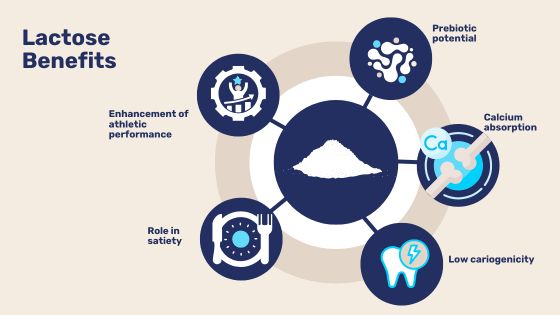
The health benefits of lactose: more than just a source of energy
Lactose, commonly referred to as “milk sugar,” is far more than a simple carbohydrate. Recent scientific literature highlights that beyond its role as an energy substrate, lactose may exert multiple physiological functions and confer various health benefits.
Dr. Mathilde Guerville, PhD in Nutrition and member of the Nutrition R&D department at Lactalis Group, presents a comprehensive literature review that elucidates the multifaceted roles of lactose in human health. This article explores the diverse effects of lactose, ranging from enhanced calcium absorption to its potential prebiotic properties, while acknowledging that lactose digestion capacity varies among individuals due to genetic and epigenetic factors.
A Sugar with Multiple Health Benefits
Prebiotic Potential: Supporting the Gut Microbiota
Lactose may function as a prebiotic. A portion of ingested lactose escapes digestion in the small intestine and is subsequently fermented by the colonic microbiota. This fermentation process promotes the growth of beneficial bacterial genera such as Lactobacillus, Bifidobacterium, and Faecalibacterium, which are known to support a balanced gut microbiome. A healthy microbiota is essential for optimal digestion, metabolic regulation, and immune function, thereby contributing to overall health.

Calcium Absorption: A Key Role in Infants
Lactose plays a critical role in calcium absorption, particularly in infants. Its hydrolysis into glucose and galactose, along with the production of organic acids, may lower gastrointestinal pH, thereby enhancing calcium ion solubility and transport (Ilesanmi-Oyelere & Kruger, 2020). While this effect has been demonstrated in animal models (Weaver et al., 2011) and infants (Abrams, Griffin & Davila, 2002), it has not been consistently observed in healthy adults (Brink et al., 1993; Zittermann et al., 2000). Nevertheless, by facilitating the absorption of this essential mineral, lactose may contribute to bone health and reduce the risk of osteoporosis and fractures.
A sugar with low cariogenic power
Unlike other sugars, lactose exhibits low cariogenic potential due to its reduced acidogenicity (Woodward & Rugg-Gunn, 2020). Compared to sucrose, lactose consumption results in slower and lower acid production and maintains a higher oral pH (~6.0), making it less likely to contribute to dental caries. This property renders lactose a more tooth-friendly carbohydrate, particularly beneficial for children who are more susceptible to dental decay.
Role in Satiety: An Ally for Better Eating
Lactose may also influence satiety. Its low glycemic index and regulatory effect on ghrelin—the so-called “hunger hormone”—suggest that lactose could help prolong satiety. This may be advantageous for individuals aiming to manage body weight or for athletes seeking to optimize caloric intake.

Improving Athletic Performance: A Smart Fuel
Contrary to the belief, lactose consumption may enhance athletic performance and support post-exercise muscle recovery. Lactose provides glucose and galactose, which are readily utilized for glycogen resynthesis (Odell, Podlogar & Wallis, 2020). Recent evidence also indicates that lactose ingested in moderate amounts (48 g/h) during exercise is as efficiently metabolized as sucrose, while sparing carbohydrate stores and increasing fat oxidation (Odell, Podlogar & Wallis, 2020). These findings position lactose as a valuable nutritional ally for athletes.
Conclusion: Rediscovering Lactose in Light of Recent Research
Far from being a mere energy source, lactose reveals a spectrum of unexpected health benefits. By promoting calcium absorption, exhibiting low cariogenicity, contributing to satiety and physical performance, and potentially acting as a prebiotic, lactose stands out as a valuable nutritional component. These positive effects, though dependent on individual digestive capacity, underscore the importance of moderate and personalized consumption. These new scientific insights offer an opportunity to reframe lactose as a biologically active compound with long-term health implications. Consequently, dietary recommendations should be tailored to individual profiles and needs.
For more information on lactose, another available article : click here
A question ? Contact-us !















